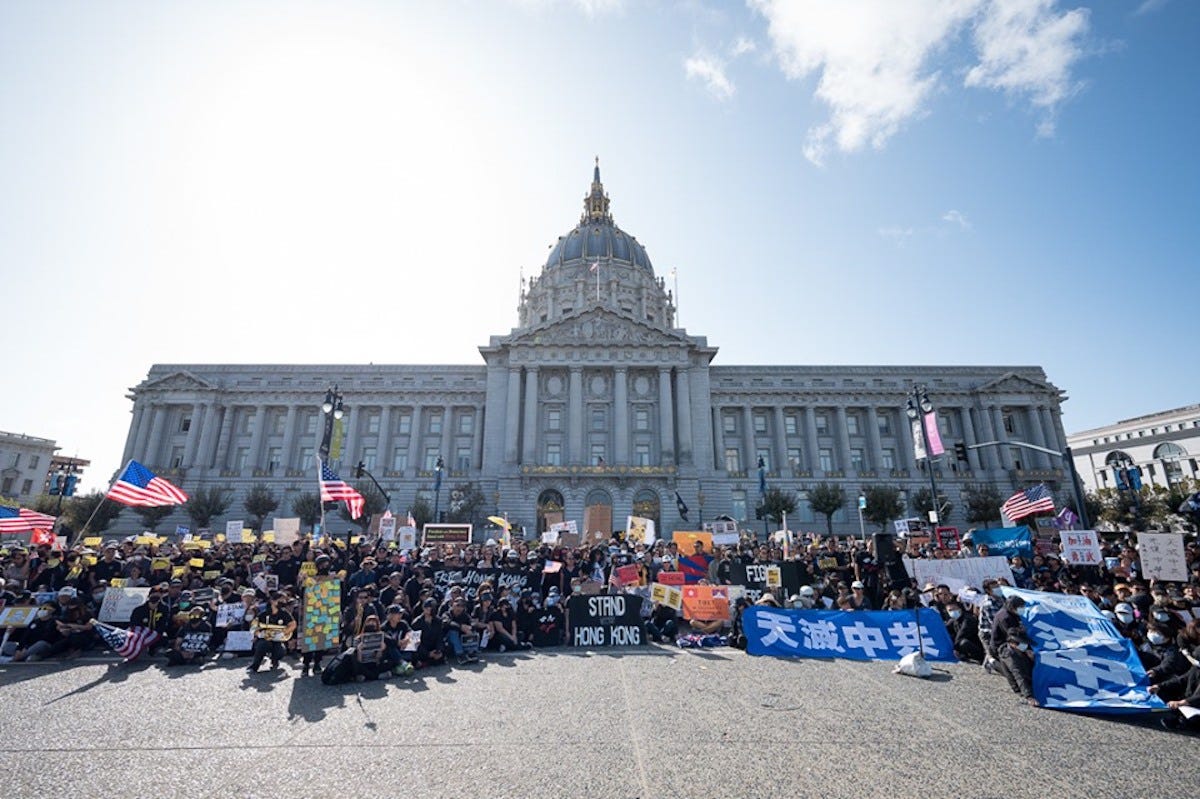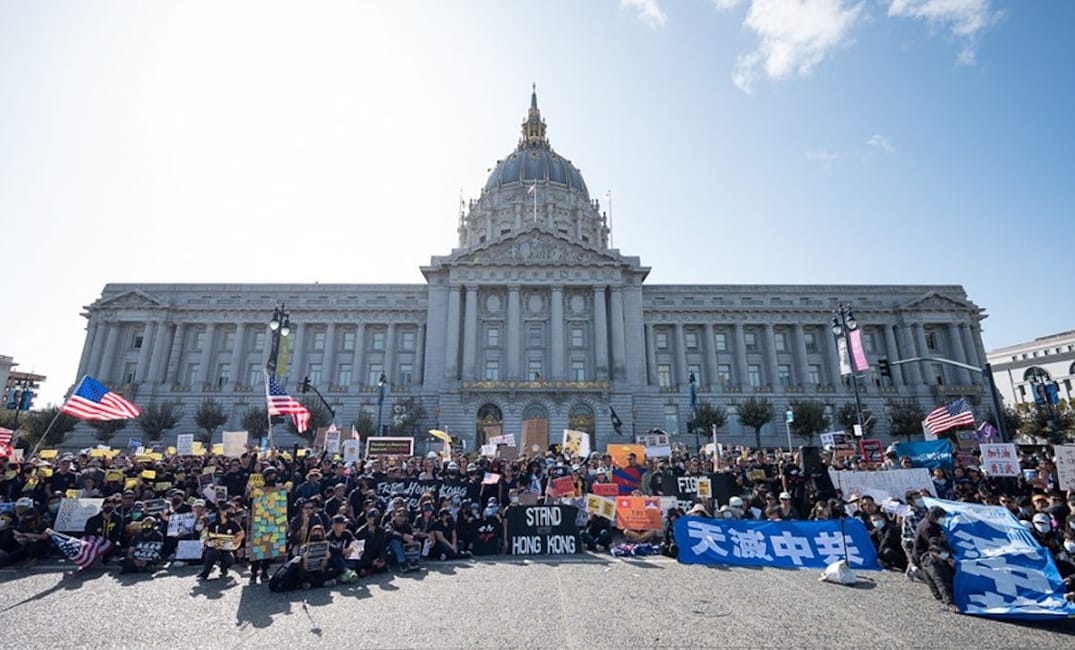
Speaking out on Hong Kong’s tumultuous relationship with China is now an act that has international consequences. Simply look at the uproar and the backpedaling after the Houston Rockets’ general manager Daryl Morey tweeted in support of Hong Kong’s democracy movement. Now the NBA—including Steve Kerr and LeBron James, who were previously vocal on political matters—is widely seen as self-censoring in an effort to not offend China, its largest market.
But even as self-censorship on the former British colony and its pro-democracy protests have become part of how high-profile American companies—including Apple and Activision Blizzard—operate, Bay Area residents and groups have activated to support compatriots an ocean away.
The Bay Area boasts one of the largest Chinese American populations in the country, including a thriving Hong Kong diaspora (expatriates, immigrants, and descendants with ties to the city). That includes the Northern California Hong Kong Club (NorCal Hong Kong Club), which has been instrumental in coordinating events across the Bay Area since the protests first broke out; the club and its sister organizations also uphold the Bay’s grand tradition of protests.
The NorCal Hong Kong Club was first established in 2011 for Bay Area residents who were concerned about democracy in Hong Kong. As a direct precursor to today’s events, the club held rallies to raise awareness of the 2014 Umbrella Movement; it’s also one of the hosts for an annual candlelight vigil for victims of the Tiananmen Square massacre in Chinatown’s Portsmouth Square. Today, the group has a core group of 10 organizers, who also run a mailing list, a Facebook group, and a Twitter account to mobilize Bay Area residents in both Cantonese and English.
The club kicked into action almost immediately after mass protests in Hong Kong broke out over the Extradition Bill in June. It held a march on June 9 that began in Portsmouth Square and ended in front of the Hong Kong Economic and Trade Office at 130 Montgomery Street, which represents the Hong Kong government here in San Francisco.
The group didn’t expect that many people to show up, but 500 to 600 people came. Even people who did not have connections to Hong Kong came, said Ken Chan, one of the organizers.
Since then, the group has coordinated with other local organizations to create Lennon Walls around the Bay, hold protests at the Chinese consulate in San Francisco, and organize rallies from Berkeley to Palo Alto, often as part of global efforts to raise awareness. There was a flash mob along the Embarcadero and a rally on the Golden Gate Bridge. Supporters have come from around the Bay — some as far as Sacramento or beyond — to attend events, and attendance has grown as Hong Kong’s summer of discontent evolves into autumn.
“Many of the Hong Kong professionals and students in the Bay Area were already organized before the protests, some in Berkeley, some in the South Bay,” Chan told me.
These already existing networks have proven critical to the group’s ability to respond quickly and raise awareness. One organizer who is affiliated with the club, Charles Lam, is a moderator of a closed Facebook group with about 4,000 members from Hong Kong. “Before the June movement,” he explained, “we mostly got random questions about living in the United States. It was mainly for people helping each other, but one difference is that we’re quite ‘yellow,’ meaning that we’re pro-democracy.”
Lam said that since the protests in Hong Kong erupted over the Extradition Bill and the resulting police brutality, his Facebook group has seen a significant gain in members. He jokingly thanked Carrie Lam, the embattled chief executive of Hong Kong, for her help.
“Ironically, I’m actually pro-law enforcement,” Lam explained when I asked why he got involved. “But since the June movement, the [Hong Kong] police — which was once called Asia’s finest — has had no accountability.”
Social media is also critical to raising awareness. “The war today is not fought on the battlefield, but in media and social media,” said Agnes Lin, another NorCal Hong Kong Club organizer (she asked that her name be changed since she is an NGO worker who deals with China). “We need to get our voices out.”
Unlike other cities around the world, the rallies and marches here in the Bay Area have not seen counter-protests from those who support the Communist Party of China — often recent mainland Chinese immigrants and expatriates. But Chan pointed out that there is a significant group of mainland Chinese people who do appear at rallies and protests: the dissident Chinese community.
At an August rally that I attended in Justin Herman Plaza, one older man introduced himself to the crowd in Mandarin to applause. He was a mainlander who supports Hong Kong’s democracy movement, and he spoke movingly of his memories of the 1989 Tiananmen Square massacre.
One question that looms over the club, and for those in the diaspora who are involved in supporting Hong Kong, is what it hopes to accomplish. The members of the club spoke about raising awareness among American communities, as well as appealing directly to local representatives and explaining why it’s relevant to their constituents.
In one important move, the club and its sister groups have worked on a letter-writing campaign to representatives and senators, urging them to co-sponsor and vote for the Hong Kong Human Rights and Democracy Act, which has bipartisan support. Earlier this week, it passed the House and is now up for a vote in the Senate.
“There’s a responsibility for us in our capacity to help,” said Chan, who pointed out that Hong Kong Americans can pressure their government in ways that Hong Kongers cannot. “What we’re trying to accomplish is to get more people involved. We can amplify our voice and feed information back to Hong Kong in support. But it’s not enough.”
“What we are fighting for now are really universal values: freedom of speech, freedom of the press, and democracy,” Lin added. “I’m hoping that through this movement in Hong Kong, we get to promote those values.”







